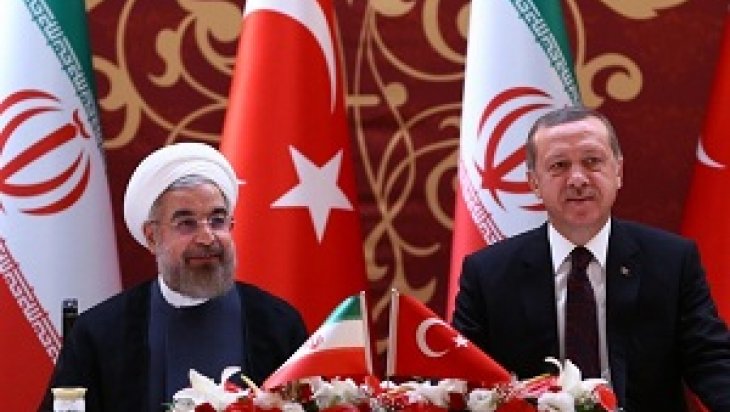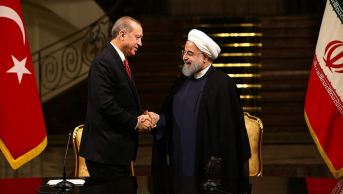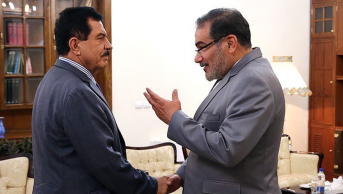Effects of the Coup Attempt on Turkey-Iran Relations

Turkish officials, notably President Recep T. Erdoğan showed strong reactions to the ambivalent statements of Turkey’s Western allies about the coup attempt of July 15. Against the ambivalent attitude of the West, Minister of Foreign Affairs Mevlüt Cavuşoğlu stated, “one of the biggest support during the coup attempt has come from Russia.” Iran was also one of the states thatclosely followed the developments in Turkey on that night and clearly supported the Turkish government.
Iranian Government Supports Turkey
Iran was on red alert at the earlier hours of the coup attempt. The transactions were halted at the customs gates, the borders were closed and the flights between the two countries were suspended. Military units were deployed in the border regions in order to ensure security.A crisis desk was set up by the Ministry of Foreign Affairs of Iran in order to monitor the coup attempt.
In his first message on twitter at the earlier hours of the morning, Minister of Foreign Affairs Javad Zarifindicated that he was deeply concerned about the crisis in Turkey; that stability, democracy and security of Turkish people were paramount and it was necessary to remain united and prudent.Zarifshared another tweet almost three hours later that stated, “Turkish people’sbrave defense of democracy and theirelected government, proves that coups have no place in our region and are doomed to fail.” Zarif made three telephone conversations with his counterpart Cavusoglu on Saturday, July 16,in order to closely follow the developments and provide support. In a press statement made on the same day, the Spokesman of the Ministry of Foreign Affairs of Iran BahramGhasemitold that Iran was “deeply concerned about stability, security, unity, democracy and rule of law in Turkey” and stressed that Tehran supports democratically-elected government in Ankara.”
In the meantime, the Supreme National Security Council convened under the chairmanship of President Rouhani. Secretary of the Security Council Ali Shamkhani made a statement at the end of the meeting and summarized Iran’s official position as “the support for the legitimate government in Turkey and the rejection of the coup.”Speaker of the Parliament of Iran Ali Larijani sent a message to his Turkish counterpart Ismail Kahraman. In his message, he congratulated Turkish people, government and parliament for “the victory of the nation’s will, national sovereignty and democracyover a desperate and doomed measure” against the country’s democratically elected bodies. Larijani also said that Iran had a system based on the votes and demands of the people as well as Islamic principles and therefore, it always supported the elected governments and condemned the attacks to the Assembly, the symbol of democracy and national will.The Parliament of Iranheld a closed session on the coup attempt and heard Foreign Affairs Minister, Zarif on July 7. Hestated that a group in the army attempted to stage a coup but failed at the very beginning since the public showed resistance and defended democracy. Having indicated that building peace and stability in Turkey is of utter importance for Iran, Zarif said that he was the first minister of foreign affairs to condemn the coup attempt.
Iranian President Rouhani made a reference to the coup attempt in a speech made in Kermanshah on July 17, and added: “We live in a region, where some still think that they can transfer power through coups or overthrow a government elected by people’s votes with the use of military tanks, artillery, aircraft and helicopter ... the era of coups is over, and that coups and tanks are not the solution.”Rouhani called President Erdoğan on July 18and appreciated his “effective management” during the crisis and he stated that Iran would stand with Turkish nation and the legitimate government.
Notwithstandingthe evident support of the government officials to the Turkish government in the face of the coup, conservative circles and security bureaucracy harshly criticized Turkey. Ali Akbar Velayati, foreign policy adviser to Iran's Supreme Leader Ayatollah Khamenei, stressed that ‘Iran is a state governed by religious democracy ... andis naturally against any illegal move and act of bullying to change popular governments’ and he stated that Iran opposesoverthrowing elected government in Turkey by a coup d’etat under the influence of whatever factors.Velayati added that Assad in Syria has also been elected and supported by his people and said: “We hope that a day would come when the Turkish administration would also respect the opinion and vote of the Syrian people and leave it to the Syrian people to determine their government”.Likewise, Hossein Amir-Abdollahian, advisor to the Minister of Foreign Affairs, stated that Iran defended the legitimate government in Syria against external interference and terrorism to the same extent as it condemned the military coup attempt against President Erdoğan. Amir-Abdollahian added that Erdoğan and Assad“are two legitimate leaders of two important countries who have taken office through the votes of their nation and democracy.” Secretary of Supreme National Security Council Ali Shamkhani argued that ‘rejecting coups and supporting the governments elected based on people's real vote is a‘principled and fixed policy’ of Iran, and in this regard Turkey was no exception. “It is the reason for our presence in Syria too,”Shamkhani added.
Some Friday prayers’ leaders in Iran also addressed the coup attempt on July 22.Tehran Friday prayers’ leader, Ayatollah S. Ahmad Khatami was vocal in his criticisms towards Turkey.“The Islamic Republic of Iran strongly condemned the coup d'etat in Turkey … but Iran's support for Turkey does not mean we approve whatever Erdoğan does” he said.Khatami said that Iran attached importance to the votes of the people, thus was opposed to a military coup attempt in Turkey from the very beginning but would continue to criticize Turkish government. Claiming that Turkey supported ISIS, Khatami argued that President Erdoğan should apologize to all the victims of ISIS.
In the press conference held on July 24, Turkish Ambassador to Tehran R. HakanTekin informed Iranian media of the coup attempt.Tekin expressed his satisfaction with the attitudes of Iranian authorities to the military coup. When one journalist reminded that the FridayPrayers Leaders adopted a different attitude, Tekin said that Turkey felt uncomfortable in this sense and shared its concerns with their Iranian counterparts.
Why did Iran stand against the Coup?
Iranian officials’ stand against the coup, support for the elected government and emphasis on democracy in their statements with related to the coup attempt in Turkey is worthy of attention. One of the reasons for this attitude is that civil-military relations in Iran, which has beena very controversial issue. In the last couple of months, there are some heated debates between President Rouhani and the Revolutionary Guards, some of which publicly appeared in media. The statements of President Rouhani can be especially considered within this framework. Of course, the emphasis on supporting elected governments and democracy aimed at some foreign policy goals, as well. Iran has propagated for some years that it supported the leaders elected by the popular vote in the region, notably in Syria. Indeed, by comparing the Iranian support for the elected government in Turkey to its support for the ‘elected’ legitimate government in Syria, some officials and media outlets have claimed that Iran has followed a principled foreign policy.
Why did Iran stand against the coup attempt in Turkey and support President Erdoğan despite the differences between the two countries on regional affairs? In fact, Iran has been uncomfortable with Turkish foreign policy in the Middle East for a while. Some Iranians have partly blamed PresidentErdoğanfor ‘the high costs’ that Iran ‘paid in Syria and even in Iraq, including costs in life and financial costs.’Sadegh Kharrazi one of the prominent figures in diplomacy spoke in a panel titled “Turkey after the Coup Attempt” held in Tehran on July 26 and also attended by Ambassador Tekin, and claimed that the coup attempt was “the boomerang effect of Erdoğan’s grave mistakes ... in the region.” Likewise, a video footage that was uploaded on Youtubeon July 17 and alleged recorded in SayyidahZaynab shrine in Syria, apparently displayed the pleasure of Iranian militia with the coup attempt. On the other hand, Iran was concerned about the unpredictability of results of the coup attempt and the prospective instability in Turkey. These concerns also increased especially because it was not known who was behind the coup attempt. Since 1980, Turkey-Iran relations were negatively affected at times when the military was influential in Turkey’s politics.In the statement that the coup plottersforced a speaker to read on TRT, the national public broadcast agency of Turkey, they declared their commitment to NATO, which raised doubts on the Iranian side with the potential involvement of the USA in the coup attempt.Hence, the overthrow of the government in Turkey by a military coup might have caused Iranian government to face indefinable risks. It was also known that the FETÖ (Fethullahist Terrorist Organization) that was behind the coup attempt has been known to be anti-Iran. Therefore, even though having discomforted with the regional policies of Turkey under President Erdoğan, Iranian administration preferred him, who also contributed to the improvement of Turkey-Iran relations, to remain in power.
Another reason why Iran stood against the coup is its efforts to convince Turkey to take its side in regional affairs.In this regard, Iranian officials claimed that those allies of Turkey or some states that has good relations with it were directly or indirectly involved in the coup attempt. While informing the Parliament of Iran, Minister of Foreign Affairs Zarifsuggested that such states as Saudi Arabia and Qatar stood with the coup attempt. Hussein Sheikholeslam, a foreign affairs adviser to Larijani argued that Turkey was considering to reviseits policy towards Syria and this disturbed Saudi Arabia. One of the commanders of Revolutionary Guards, Yadollah Javani also claimed that Saudi Arabia supported the coup since Turkey was about to change its policy towards Syria. Senior military advisor to Khamenei, Yahya Rahim Safavi argued that the USA and Russia were informed of the coup attempt in advance. Finally, Ayatollah Khamenei stated that there are strong suspicions about the role of the USA behind the coup attempt.
Iranian officials and journalists that claimed that ostensible allies of Turkey involved in the coup attempt,argued that Turkish government should approach to Iran. The attitude of Iranian government towards the coup and Zarif’s claim that he was the first minister of foreign affairs to condemn the coup should be considered in this direction. Kharrazi, who is mentioned above, despite all his criticism about the regional policies of Turkey said that “Iran is Turkey's lasting friend, not Qatar or Saudi Arabia” and added: “Iran and Turkey are the two most influential agents for solving regional problems.” Similarly, SadollahZarei, a well-known expert on security issues, said,“if Erdoğan behaves smartly and acts reasonably, against the increasing pressures of Europe and the USA and the security threats he should straightly approach to Iran.” Indeed, President Rouhani, when he talked to President Erdoğan after the coup attempt called attention to the role of foreign powers and terrorists in the regional instability. He later indicated that the military coup attempt was “This incident was a test for you to identify your domestic and foreign friends and enemies”. Likewise, in his meeting with Ambassador Tekin on July31, Ali Akbar Velayati said the “coup helped Turkey to distinguish ‘friend’ from ‘foe’.”
Turkish officials noted Iran’s support to Turkish government against the coup attempt but it is uncertain to what extent this will affect the regional policies of Turkey. Ambassador Tekinargued that the coup attempt would not affect the NATO membership of Turkey or lead a fundamental change in foreign policy. On the other hand, in his phone conversation with Rouhani, President Erdoğan said, “We are determined to join hands with Iran and Russia to resolve regional issues and intensify our efforts to restore peace and stability to the region.”However, considering the profound differences between the two countries on regional issues, it is very difficult to turn Turkey-Iran relations to a regional cooperation. Nevertheless, bilateral relations between Turkey and Iran successfully passed the test during the coup attempt.









